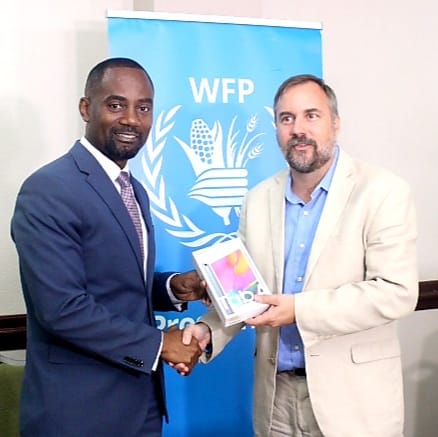Changes to Barbados’ social protection system are necessary to protect the most vulnerable and respond to “shocks” to the system.
Minister of People Empowerment and Elder Affairs, Kirk Humphrey, underscored the importance, noting that Government had already begun the process of making the necessary changes to its system as it sought to restructure the social services sector.
He made this disclosure as he addressed the opening of a Shock-Responsive Social Protection in the Caribbean training programme at the Accra Beach Resort and Spa on Tuesday.
It was hosted by the World Food Programme (WFP) in partnership with the Caribbean Disaster Emergency Management Agency (CDEMA). It also saw the Ministry being presented with 95 tablets from the WFP to further the digitisation process in Barbados.
Noting that the country had a “relatively strong” social protection system for a long time, Mr. Humphrey explained the restructuring process would see the amalgamation of the National Disabilities Unit, the Welfare Department, the National Assistance Board and the Child Care Board. However, it will also involve a legal and administrative framework, which will see the introduction of legislation.
Mr. Humphrey outlined that while there was presently no legislation to protect the elderly in Barbados, his Ministry was expecting to have the final policy by the end of next month, and draft legislation by early next year.
“We have the draft legislation for persons with disabilities. We also have legislation…[on] the Child Protection Policy. We are a lot better off than we were a year ago,” he said.
It was also disclosed that the Ministry, in collaboration with the Caribbean Development Bank, was preparing a paper to take to Cabinet to allow for the conduct of a Poverty Assessment of the country to gather the necessary data to feed into the social protection systems.
“I am convinced that this is going to give us the level of information that we need to be able to make proper decisions; the level of data will allow us to intervene, to comprehensively and cohesively deliver goods, services, policies and programmes…,” Mr. Humphrey stated.
The Minister further noted there also needed to be a closer synergy between the emergency services and Government during shocks to the system. These shocks, he said, could take the form of an earthquake, hurricane, ash fall or even the COVID-19 pandemic.
“If we are able to build out better systems, then we are able to better respond to a lot of these things,” he stressed.
Meanwhile, Representative and Country Director of the World Food Programme’s Caribbean Multi-Country Office, Regis Chapman, said approximately 4.1 million people in the Caribbean were finding it difficult to meet their basic food needs and were classified as being “food insecure”.
“In Barbados, we estimate that around 52 per cent of respondents of our survey with the CARICOM Secretariat in August of this year, were either moderately or severely food insecure,” he said, noting that compared to 33 per cent in February 2022.
He warned that persons could be left further behind if social protection systems were not equipped to reach them “before it is too late”.
However, Mr. Chapman outlined that the WFP was seeking to strengthen social protection, disaster management and food systems, particularly in response to crises.
“When national crises happen, WFP supports with food and cash assistance, emergency logistics and telecommunications by partnering with CDEMA and governments to reach the most affected,” Mr. Chapman explained.
Barbados joins Belize, Guyana and Trinidad and Tobago in undertaking the training which, among other things, is designed to identify the needs and changing vulnerabilities arising from different types of shocks in the Caribbean, and the social protection agencies’ role in addressing them. The four-day training concludes on Friday, October 21.




